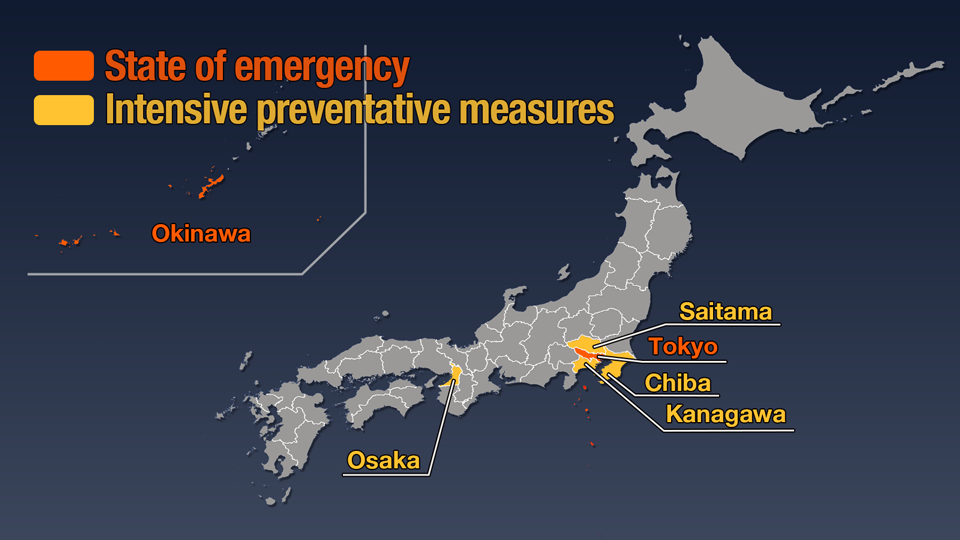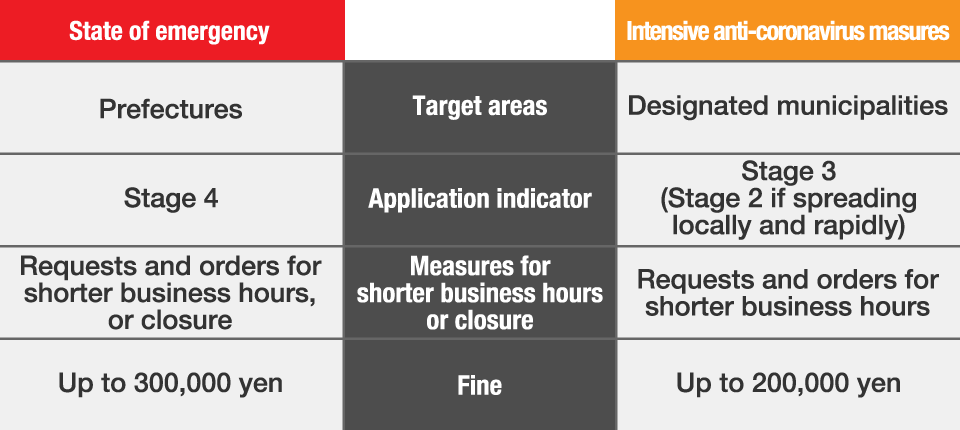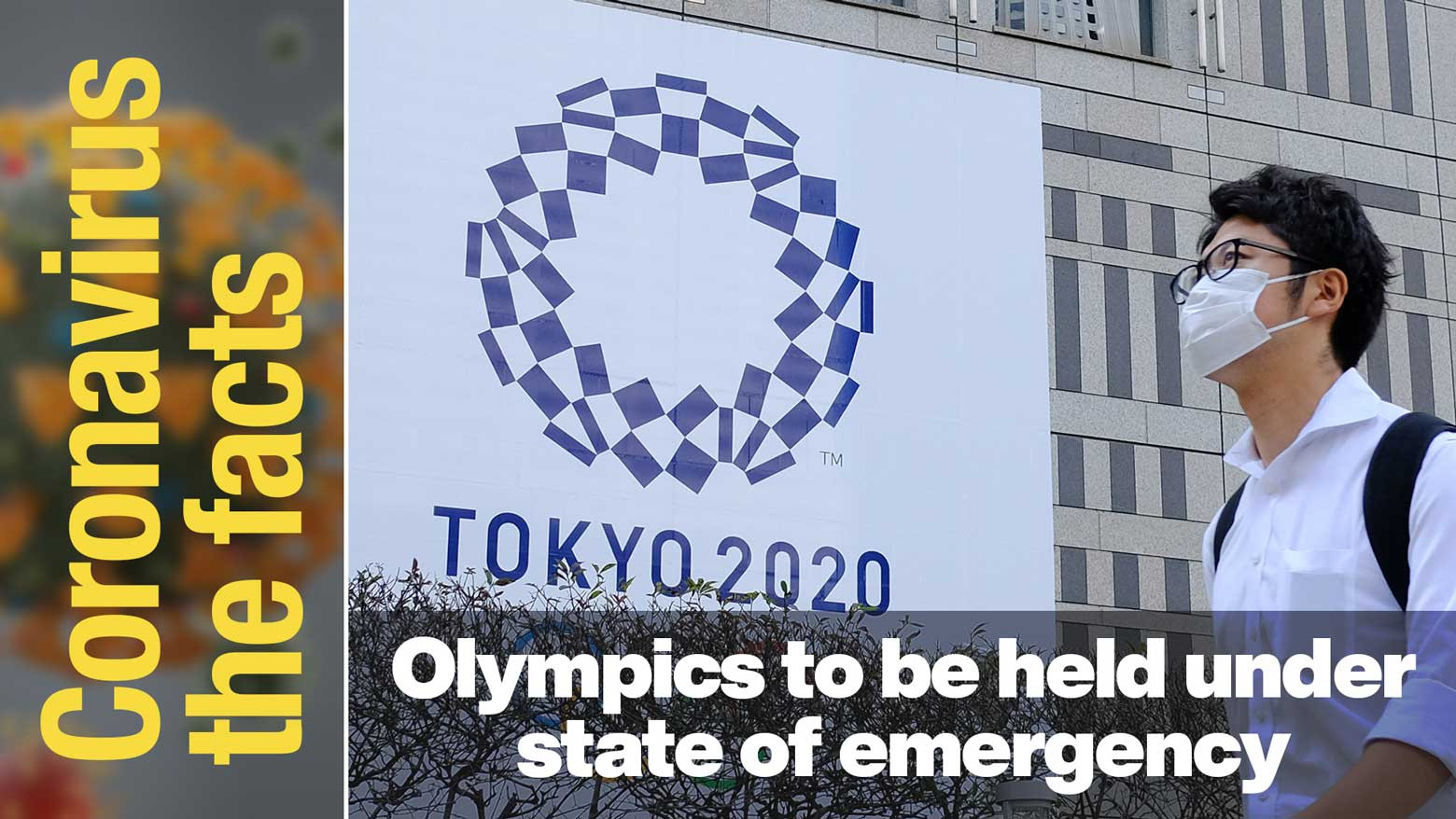This is our series on key coronavirus-related information. Click here to read other installments: #Coronavirus the facts. Find the latest information and answers from experts on everything COVID-19.
*This article is no longer up to date. Please click here for the updated version.
Tokyo enters fourth state of emergency
On July 12, Tokyo entered a fourth coronavirus state of emergency, just three weeks after lifting the previous one. This comes as cases are rising throughout the capital and has led the government to announce that the Tokyo Olympics will be held mostly behind closed doors. As of July 18, over 1,000 new cases are reported for five consecutive days.
Tokyo had already been under intensive anti-infection measures from June 21 through July 11.
The central government also extended a state of emergency for Okinawa Prefecture and intensive anti-virus measures for the prefectures of Saitama, Chiba, and Kanagawa, which neighbor Tokyo, as well as Osaka Prefecture. Intensive measures for Hyogo, Kyoto, Aichi, Fukuoka, Hokkaido prefectures were lifted as scheduled on July 11.
Both the emergency declarations and intensive measures are scheduled to run through August 22. The duration includes the Tokyo Games, which start on July 23 and end on August 8, as well as the mid-August Obon holiday.

Tokyo measures
The key measures in place in Tokyo are listed below. For details and information on other prefectures, please visit the individual prefectural government websites.
Excursions
- Requests remain in place for residents to avoid nonessential excursions, and refrain from travel between prefectures.
- Companies are urged to implement remote working policies, with the goal of reducing the number of commuters by 70 percent. In-office employees should finish their work by 8 p.m. and go home directly.
Bars and restaurants
- Bars and restaurants that serve alcohol are asked to close. Those that don't provide alcohol are allowed to operate until 8 p.m. Takeout and delivery services can continue as normal.
- People are asked to refrain from drinking in groups on the street or in parks.
Large commercial facilities
- Large-scale commercial facilities, including department stores, are asked to close by 8 p.m. Areas within these sites that offer everyday products can remain open as normal.
- Theaters, exhibition halls, and movie theaters are asked to close by 9 p.m.
Events
- Event organizers are asked to limit venue capacity to half or a 5,000-person cap, whichever is smaller. Events must end by 9 p.m. They are asked to urge attendees to not stop anywhere on the way to or from venues.
Differences between intensive measures and state of emergency
Intensive anti-virus measures are part of the revised coronavirus special law enacted in February. They allow the governors of targeted prefectures to take special steps without declaring a state of emergency. The prime minister decides which prefectures are covered and for how long.
While a state of emergency covers an entire prefecture, intensive measures allow governors to focus on specific municipalities.
A state of emergency can be declared when the infection situation reaches the highest level on the government's four-tier alert system. The intensive measures correspond with Stage Three, but can also be applied at Stage Two if infections are spreading rapidly.

Requests and orders
Under intensive measures and state of emergency declarations, governors can ask businesses to shorten operating hours. If a business ignores the request, governors can issue an order – and publish the name of the business. On-site inspections from local officials are also permitted.
A request for business closure can only be made under a state of emergency.
Fines
The prefectural government can impose fines on businesses that don't cut operating hours, or refuse on-site inspections. Intensive measures allow fines of about 200,000 yen. This rises to 300,000 yen under a state of emergency.
This information is accurate as of July 19, 2021.
